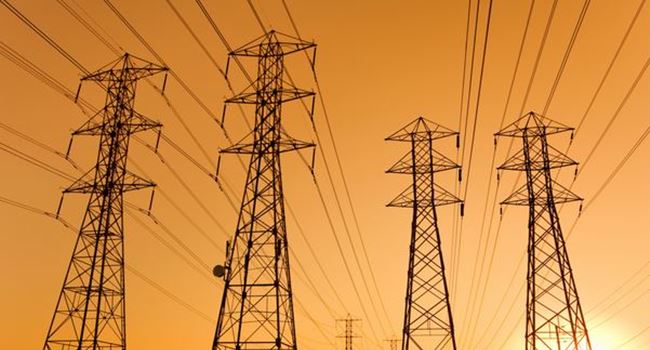Business
GENCOs give reasons for poor electricity as supply plunges to 1,393.40MW

As the country continues to suffer from appalling electricity supply which dates back to weeks with its attendant negative ripple effects on the country, the Generation Companies (GenCos) have disclosed the reason behind the situation.
This was disclosed on Sunday by the Executive Secretary of the Association of Power Generation Companies (APGC), Dr Joy Ogaji, during a press conference in Abuja.
APGC is the coalition body of the GenCos.
Various checks revealed that as at 5pm yesterday, the national grid supply was just 1,393.40 Megawatts with only nine plants generating to the grid.
According to Ogaji, the Nigerian Bulk Electricity Trading (NBET) Plc are responsible for the appalling power situation due to its refusal to fulfill its obligations to the GenCos as contained in the Power Purchase Agreements (PPA).
In a detailed breakdown, the APGC Chairman disclosed that NBET owed the GenCos N214.93 billion in 2015; N273.32 billion in 2016; N236.47 in 2017, N264.08 billion in 2018, and N256.97 billion, N266.01 billion and N120.25 billion in 2019,2020 and 2021 respectively.
Consequently, Dr Ogaji noted that the humongous debt has hampered the ability of the GenCos to function optimally regarding maintenance and power distribution while clarifying that if the debts were paid, the GenCos could generate 9,000MW immediately.
She said that the “illiquidity caused by the huge sums owed GenCos by NBET, has more than ever before continued to frustrate the GenCos and kept them incapable of meeting their obligations which are extremely necessary to keep their power plants running and make capacities available, while observing required Health, Safety and Environment (HSE) standards.
“Such obligations include our operations and maintenance (O&M) as and when due, procurement of critical capital, spare parts and accessories, payment, and servicing of existing loans from lenders and financiers, employee obligations, etc.
Read also: Senate probes Gencos, Discos over unsteady power supply. Will Nigerians see the result?
“Recently, GenCos cried out to the authorities and are still looking forward to a favourable consideration of their pleas for foreign exchange support to enable them to procure critical spares for their turbines and equipment to keep them in good state of repair. This is in addition to the FX challenges faced by the Hydros, whose concession fees are dollarized.
“Most of the electricity generated in Nigeria, about 80 percent, come from gas-fired turbines. Natural gas is the feedstock or fuel of these plants. GenCos have consistently been dealing with unending gas-related challenges which inhibit optimal generation.
“Issues of gas volume, gas quality, gas pressure and gas transportation have consistently curtailed capacity utilization by GenCos thereby affecting generation.
“These issues need to be addressed and urgently too, as the GenCos have always requested. Unfortunately, the unenforceable state of the contracts in the NESI (Nigerian Electricity Supply Industry) and the broken cycle of payment assurance have made the enforcement of what would ordinarily be basic obligations of parties to the industry agreements, impossible”.
However, NBET, in a swift reaction, stated that the figures brandished by the APGC are untrue, saying only companies with active gas supply and transportation contracts were paid for unutilized capacity.
The Head Corporate Communication, NBET, Henrietta Ighomrore explained that only five power generation companies with active Gas Purchase Agreement were paid for unused capacity.
Ighomrore also clarified that the GenCos do not possess the capacity to generate 9,000MW.
According to her, claims by Dr. Ogaji that the GenCos have the capacity to generate 9,000MW were not accurate as inspections by NBET have shown that the capacity does not exist.
She said: “On the issue of capacity payments, the contract documents are very clear on how it is treated. All GenCos get paid for the associated capacity on energy delivered to the national grid. Only GenCos with active PPAs get full capacity payment based on their active gas contracts.
“You are well aware that active gas contracts are associated with the take and pay obligations, which come with more financial exposure and responsibilities.
“Nonetheless, the Regulator (NERC) has set in motion the process for partial activation of contracts in the sector, which was what necessitated the scheduled capacity test by NBET to various thermal plants around the country.
“Although, we were not able to record full participation of all GenCos, as some were either not able or showed willingness. With a better understanding of the intent, we expect full cooperation of GenCos in subsequent capacity tests of their plants. It is important to ascertain the actual capacity of our generation network to enable better planning and efficient dispatch of power within the grid network”.
“The situation in the Power Sector right now is not one for name calling or blame game, neither is it one for fictitious data reporting. As you are well aware, the Federal Government via NBET has continued to deploy innovative solutions aimed at sustaining sufficient cash flow within the Power Sector especially payments to the GenCos to ensure they meet their immediate obligations and continue to meet and ramp up generation to the National grid”.
Join the conversation
Support Ripples Nigeria, hold up solutions journalism
Balanced, fearless journalism driven by data comes at huge financial costs.
As a media platform, we hold leadership accountable and will not trade the right to press freedom and free speech for a piece of cake.
If you like what we do, and are ready to uphold solutions journalism, kindly donate to the Ripples Nigeria cause.
Your support would help to ensure that citizens and institutions continue to have free access to credible and reliable information for societal development.
























